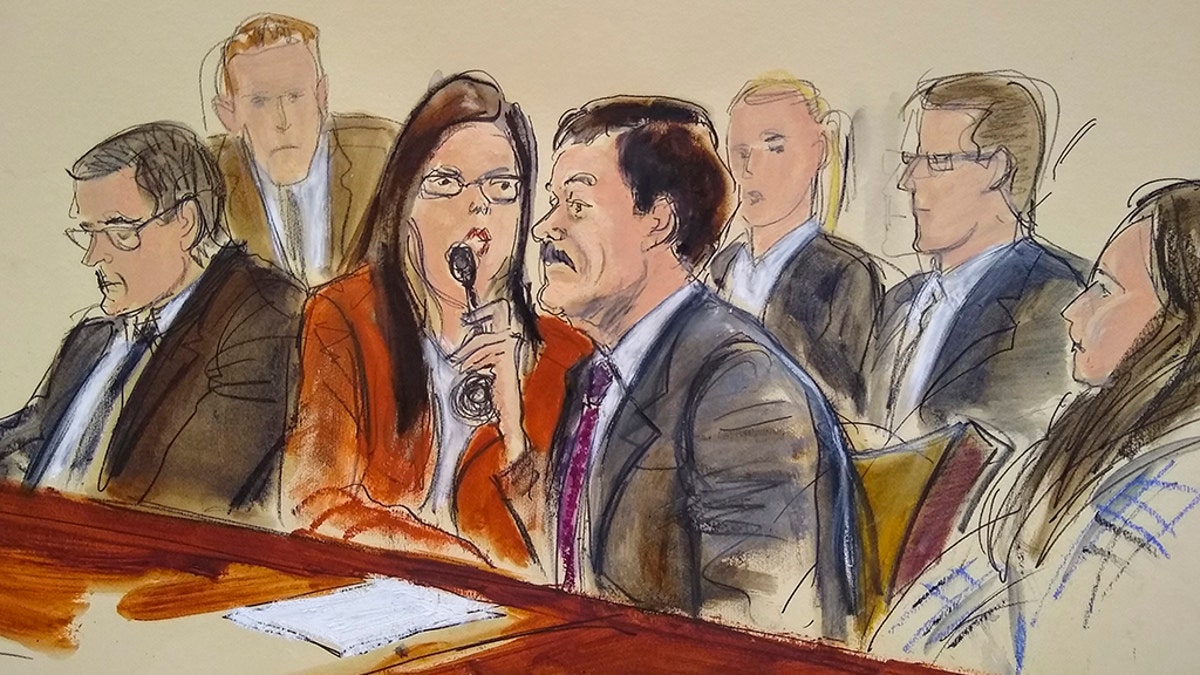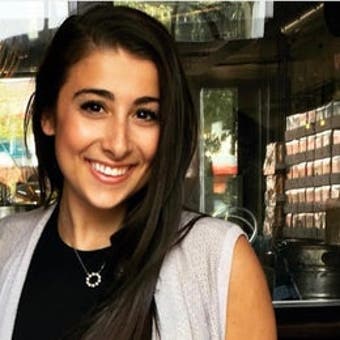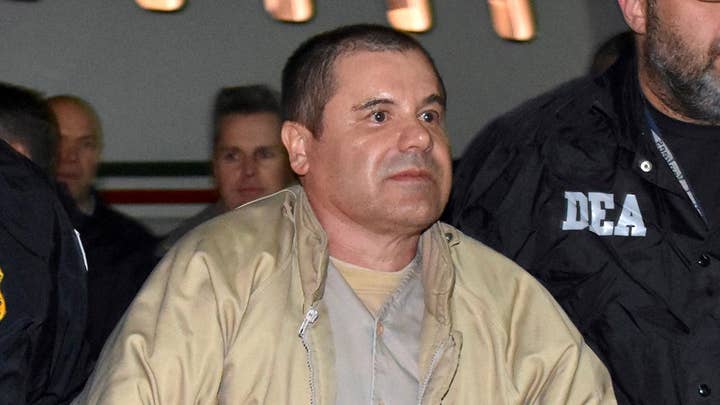New video of Mexican drug lord 'El Chapo' in prison
WATCH: Newly released video shows Mexican drug lord Joaquin 'El Chapo' Guzman being registered at a Mexican jail.
Attorneys representing notorious Joaquin "El Chapo" Guzman Loera handed down oral arguments on Monday in the appeal of the Mexican drug kingpin’s U.S. conviction.
Marc Fernich, Guzman’s defense attorney, and prosecutors delivered arguments for more than an hour to the panel of judges for the 2nd U.S. Circuit Court of Appeals in New York, who will hand down their decision in a court filing. It’s unclear when a ruling will ultimately be made.
Beginning just before noon, Fernich argued that Guzman’s conviction should be sent back to lower courts for further evaluation or overturned completely and that his client should be given a new trial. He argued there were two reasons for appeal, one being the conditions and his treatment inside the now closed Metropolitan Correctional Center in Manhattan, New York – or, in Fernich’s words, Guzman’s "indefinite pre-conviction solitary confinement in a modern dungeon."
MEXICAN DRUG KINGPIN EL CHAPO'S WIFE PLEADS GUILTY TO US DRUG TRAFFICKING, OTHER FELONY CHARGES

In this courtroom sketch, Joaquin "El Chapo" Guzman, second from right, listens to his sentence via interpreter while surrounded by U.S. Marshals and flanked by his defense attorney Marc Fernich, during his sentencing in federal court, Wednesday, July 17, 2019, in New York. (AP)
For his second reason, Fernich cited a news report that during deliberations jurors were exposed to salacious claims that were barred from the trial, including that Guzman sexually abused girls he referred to as "vitamins" that gave him energy.
He asked the judges to resist any "punitive impulse" toward someone who was cast as a "public enemy," like gangster Al Capone.
"The guy is going to be in a box for the rest of his life," Fernich told the court. "I’m not asking you to play violins for him … This is his last shot."
He later added: "Who can leave this cloud of uncertainty? And in a case of this magnitude?" That's not what we do here."
Assistant U.S. Attorney Hiral Mehta argued the lower court was right to reject the defense request for a hearing on the jury issue because there was no valid evidence of misconduct. He said the Vice News report — based on a post-conviction interview with a juror who wasn’t named — amounted to "hearsay and double hearsay."
EL CHAPO: WHAT TO KNOW ABOUT CONVICTED DRUG KINGPIN
Meanwhile, Assistant U.S. Attorney Brett Reynolds said there was "no dispute that the district court here followed the correct standard" – especially given Guzman’s history of escaping jail and prison cells.
Guzman, Reynolds said, "had already escaped from prison twice in Mexico in dramatic fashion … had a history of intimidating and killing perceived rivals, and … had previously run his criminal enterprise while incarcerated."
"On those facts, with no real dispute about the legal standard, there's no basis to overturn the district court's conclusion," Reynolds added.
Guzman was sentenced in 2019 to life behind bars for a massive drug conspiracy that spread murder and mayhem for more than two decades.
Before the federal case, he had attained near-mythical status by escaping from prison twice in Mexico, the second time through a tunnel dug into the shower of his cell. He was recaptured and sent in 2017 to the United States and put in solitary confinement.
At trial, Guzman’s lawyers argued he was the fall guy for other kingpins who were better at paying off top Mexican politicians and law enforcement officials to protect them.
The judges, while sounding open to the arguments about potential juror prejudice, showed less patience with another claim that Guzman’s defense was unfairly hindered by the strict terms of confinement that were imposed in response to his reputation as an escape artist.
Lynch challenged Fernich’s characterization that Guzman was thrown into a "modern dungeon," pointing out that his lawyers had constant access to him leading up to the trial.
"He’s not isolated from the world," Lynch said. "He’s seeing people on a regular basis."
CLICK HERE TO GET THE FOX NEWS APP
In the meantime, Guzman is being housed at ADX Florence, also known as "Supermax," in Colorado.
After Monday’s hearing, Fernich told Fox News the conditions there are "very, very harsh."
"There's been substantial deterioration over a long period of time," he said, when asked how his client was doing. "But all of that said, he's always been a pretty strong fellow and I would say that, given what he's facing, he's baring up admirably, better than anyone would have the right to expect, despite evident deterioration."
The Associated Press contributed to this report.






